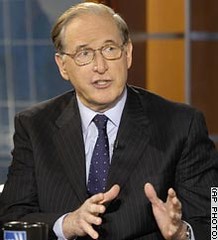Thursday, November 17, 2005
Jay Rockefeller (D-WV)

"There is unmistakable evidence that Saddam Hussein is working aggressively to develop nuclear weapons and will likely have nuclear weapons within the next five years has made in development of weapons of mass destruction...
We also have to acknowledge that any military operations against Saddam Hussein pose potential risks to our own homeland, too. Saddam’s government has contact with many international terrorist organizations that likely have cells here in the United States...
Americans will return to a situation like that we faced in the Cold War, waking each morning knowing we are at risk from nuclear blackmail by a dictatorship that has declared itself to be our enemy. Only, back then, our communist foes were a rational and predictable bureaucracy; this time, our nuclear foe would be an unpredictable and often irrational individual, a dictator who has demonstrated that he is prepared to violate international law and initiate unprovoked attacks when he feels it serves his purposes to do so.
The global community -- in the form of the United Nations -- has declared repeatedly, through multiple resolutions, that the frightening prospect of a nuclear-armed Saddam cannot come to pass. But the U.N. has been unable to enforce those resolutions. We must eliminate that threat now, before it is too late.
But this isn’t just a future threat. Saddam’s existing biological and chemical weapons capabilities pose a very real threat to America, now. Saddam has used chemical weapons before, both against Iraq’s enemies and against his own people. He is working to develop delivery systems like missiles and unmanned aerial vehicles that could bring these deadly weapons against U.S. forces and U.S. facilities in the Middle East.
And he could make those weapons available to many terrorist groups which have contact with his government, and those groups could bring those weapons into the U.S. and unleash a devastating attack against our citizens. I fear that greatly.
We cannot know for certain that Saddam will use the weapons of mass destruction he currently possesses, or that he will use them against us. But we do know Saddam has the capability. Rebuilding that capability has been a higher priority for Saddam than the welfare of his own people -- and he has ill-will toward America.
I am forced to conclude, on all the evidence, that Saddam poses a significant risk.
Some argue it would be totally irrational for Saddam Hussein to initiate an attack against the mainland United States, and they believe he would not do it. But if Saddam thought he could attack America through terrorist proxies and cover the trail back to Baghdad, he might not think it so irrational.
If he thought, as he got older and looked around an impoverished and isolated Iraq, that his principal legacy to the Arab world would be a brutal attack on the United States, he might not think it so irrational. And if he thought the U.S. would be too paralyzed with fear to respond, he might not think it so irrational.
Saddam has misjudged what he can get away with, and how the United States and the world will respond, many times before. At the end of the day, we cannot let the security of American citizens rest in the hands of someone whose track record gives us every reason to fear that he is prepared to use the weapons he has against his enemies.
As the attacks of September 11 demonstrated, the immense destructiveness of modern technology means we can no longer afford to wait around for a smoking gun. September 11 demonstrated that the fact that an attack on our homeland has not yet occurred cannot give us any false sense of security that one will not occur in the future. We no longer have that luxury.
September 11 changed America. It made us realize we must deal differently with the very real threat of terrorism, whether it comes from shadowy groups operating in the mountains of Afghanistan or in 70 other countries around the world, including our own.
There has been some debate over how "imminent" a threat Iraq poses. I do believe that Iraq poses an imminent threat, but I also believe that after September 11, that question is increasingly outdated. It is in the nature of these weapons, and the way they are targeted against civilian populations, that documented capability and demonstrated intent may be the only warning we get. To insist on further evidence could put some of our fellow Americans at risk. Can we afford to take that chance? We cannot!
The President has rightly called Saddam Hussein’s efforts to develop weapons of mass destruction a grave and gathering threat to Americans. The global community has tried but failed to address that threat over the past decade. I have come to the inescapable conclusion that the threat posed to America by Saddam’s weapons of mass destruction is so serious that despite the risks -- and we should not minimize the risks -- we must authorize the President to take the necessary steps to deal with that threat.
October 10, 2002
http://rockefeller.senate.gov/news/2002/flrstmt0102002.html
"The fact that Zarqawi certainly is related to the death of the U.S. aid officer and that he is very close to bin Laden puts at rest, in fairly dramatic terms, that there is at least a substantial connection between Saddam and al Qaeda."
February 5, 2003
Speaking to Wolf Blitzer on CNN regarding the implications of al Zarqawi's presence in Iraq before the war.